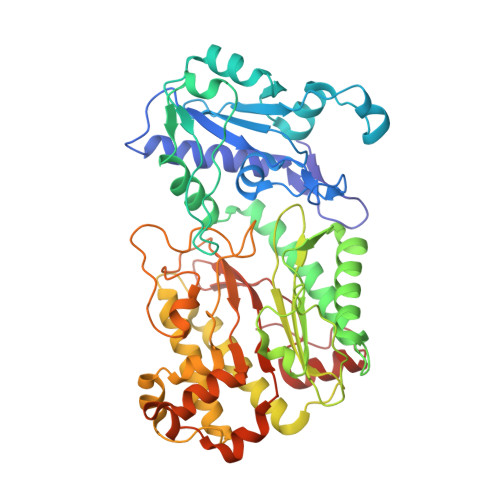Substrate specificity and reaction mechanism of human prolidase.
Wilk, P., Uehlein, M., Kalms, J., Dobbek, H., Mueller, U., Weiss, M.S.(2017) FEBS J 284: 2870-2885
- PubMed: 28677335
- DOI: https://doi.org/10.1111/febs.14158
- Primary Citation of Related Structures:
5M4G, 5M4J, 5M4L, 5M4Q - PubMed Abstract:
Prolidase is a ubiquitously distributed dipeptidase and the only dipeptidase in humans capable of cleaving the peptide bond preceding the amino acids proline (Pro) or hydroxyproline (Hyp). It is mainly implicated in the degradation of dietary and endogenous proteins. It is also involved in the terminal steps of collagen catabolism by hydrolyzing Pro and Hyp-containing dipeptides. Finally, it is believed to play a role in the regulation of peptidic hormones. Diminished or absent prolidase activity is related to a rare autosomal disease, referred to as prolidase deficiency (PD). This disease manifests itself by a variety of clinical symptoms. To date, there is no definitive cure to PD. This may in part be due to an incomplete understanding of the wild-type (wt) enzyme with respect to substrate-binding mode and consequently the mechanism of the catalyzed reaction. In this work, we describe the high-resolution crystal structures of the wt human prolidase in the ligand-free form as well as in substrate-bound states and in complex with the cleavage product Pro. This series of structures provides much relevant information for the definition of substrate-binding and the reaction mechanism. A recent study on Escherichia coli prolidase revealed how substrates of different length are discriminated. Here, based on our own structural results, we evaluate and extend this analysis. Moreover, we describe and analyze substrate and product binding in the active site and we propose that the crucial catalytic moiety is actually a hydroxide ion. This information significantly advances our understanding of prolidase-based pathologies. The refined structure coordinates as well as the corresponding structure factor amplitudes have been deposited in the PDB under the accession numbers 5M4G, 5M4J, 5M4L, and 5M4Q.
- Helmholtz-Zentrum Berlin, Macromolecular Crystallography (HZB-MX), Berlin, Germany.
Organizational Affiliation:




















